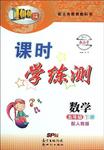
John ________ South Hill. He will be back ________ a few days.
A. has been to; in B. has gone to; in
C. has been to; after D. has gone to; after
B
【解析】
试题分析:句意为:约翰去了南山。他几天后回来。have been to表示去过某地,人已经回来;have gone to表示去了某地,人未回来。此外,“in+时间”常用于一般将来时,“after+时间”常用于一般过去时。根据语境可知应选B。
考点:考查have been to与have gone to以及in、after的用法。
考点分析: 考点1:动词和动词短语 就是表示动作和状态的词。根据其在句中的功能,动词可分为四类,分别是:实义动词、系动词、助动词、情态动词。 动词分类及用法 一、实义动词 实义动词又叫行为动词,分成及物动词和不及物动词 。 1、及物动词是必须带宾语的动词,可分为如下两类。 1) 及物动词+宾语例:I love my home. 我爱我家。 He bought an English dictionary. 他买了一本英语词典。 2) 及物动词+间接宾语+直接宾语例:She taught us maths. 她教我们数学。 My mother gave me a new pen. 母亲给了我一支新钢笔。提示:常用的能接双宾语的及物动词有:give, teach, buy, lend, find, hand, leave, sell, show, read, pay, make, offer, build, pass, bring, cook等。 2、 不及物动词不及物动词不需要跟宾语,本身意义完整。例:She came last week. 她上周来的。 It is raining hard. 正下着大雨。 Class began at half past seven. 7点半开始上课。 What happened yesterday? 昨天发生了什么事? 3、同一动词有时可用作及物动词,有时可用作不及物动词。例如:She can dance and sing. 她能唱歌又能跳舞。(sing在此用作不及物动词。) She can sing many English songs. 她能唱好多首英文歌曲。(sing用作及物动词。) 二、系动词 系动词不能单独作谓语,后面必须跟表语构成合成式谓语。表语通常由名词、形容词,或相当于名词或形容词的词或短语等充当,说明主语是什么或怎么样。连系动词有 be, seem, look, become, get, grow, feel, appear, remain, turn。 例如: The story sounds true. Those oranges taste good. 三、助动词 协助主要动词构成谓语动词词组的词叫助动词。 助动词自身没有词义,不可单独使用,只能在实义动词和系动词前构成谓语的时态、语态以及否定式和疑问式。它没有对应的汉译,例如: He doesn't like English. 他不喜欢英语。 (doesn't是助动词,无词义;like是主要动词,有词义) He is singing. 他在唱歌。(is是助动词,无词义,构成现在进行时) 四、情态动词 情态动词是一种本身有一定的词义,表示说话人对有关行为或事物的态度和看法,认为其可能、应该或必要等,不能单独作谓语,情态动词后面加动词原形。情态动词无人称和数的变化, 情态动词后面跟的动词需用原形,否定式构成是在情态动词后面加 "not"。常用的情态动词有 : Can(could) (能,会) 如:I can swim. 我会游泳。 May(might) (可以) 如: You may go now. 你现在可以走了。 Must (必须) 如:You must do your homework. 你必须写作业。 Need (需要) 如:He needs our help. 他需要我们的帮助。 注意:1、情态动词表推测在肯定句中一般用must (一定),can, could(可能),might /may(也许,或许)。否定句中用can’t / couldn’t(不可能)。例如: It can’t be the headmaster. He has gone to America. 这不可能是校长,他去美国了。 2、can和could表示允许的用法:表示现在的允许时,若是请求别人允许自己做某事,两者均可用,但用could 语气更委婉;若是自己允许别人做某事,一般只用 can,而不用 could。如: Can [Could] I come in? 我可以进来吗? 3、must和have to的用法 表示必须、必要。(must表示主观多一些而have to则表示客观多一些)如: You must come in time. 你必须及时过来。 回答must引出的问句时,如果是否定的回答,不能用mustn't,而要用needn't或don't have to。 — Must we hand in our exercise books today? — Yes, you must. (No, you don’t have to.) —我们今天必须交上练习册吗? —是的。(不,不必。) 4、need表示“需要”或“必须”,作情态动词时,仅用于否定句或疑问句中,后跟动词原形。Need还常用作实义动词,有时态、人称和数的变化,后面通常接名词、代词和带to的不定式, Do you need a dictionary? 你需要词典吗? You needn't give it back before Friday. 你不必在星期五前还我。 常见考法 对于动词的考查,通常会在单选,词语运用和完形填空中出现。除了考查时态和语态外,只要考查实义动词的固定短语,系动词和情态动词的灵活运用。 典型例题:--Must I return the magazine to you right now,Sandy/ --No,you .you may keep it until next Wednesday. A. needn't B. can't C. must D. may 解析:本题考查情态动词must构成的疑问句的回答方式。否定回答应该用 needn't 。 答案:A 误区提醒 汉语和英语的动词有较大差异,而学习者在学习是往往容易套用汉语,从而混淆意思相近而用法不同的词或词组,也容易混淆词形相近而意思不同的词或词组,例如look for和find, listen和 hear。所以我们在学习中要认真分析不同的词或词组。 典型例题:They had to ___the 800--meter race because of the bad weather. A put on B put off C get on D get up 解析:本题考查四个动词短语的区别。put on “穿上,戴上”; put off“推迟”; get on “上车”; get up“起床”。根据语境,应选put off。 答案:B 试题属性

 百年学典课时学练测系列答案
百年学典课时学练测系列答案科目:初中英语 来源:2014-2015学年江苏江阴周庄中学七年级3月月考英语试卷(解析版) 题型:单项填空
David, _________ his father, _________ playing football.
A. like; like B. likes; likes
C. like; likes D. likes; like
查看答案和解析>>
科目:初中英语 来源:2014-2015学年江苏丰县实验初级中学八年级下第一次月考英语试卷(解析版) 题型:完形填空
People all over the world eat rice. people in Asia (亚洲), Africa (非洲) and South America it every day of their lives. Some people almost don’t eat except rice.
Rice is a kind of .There are more than 7, 000 kinds of rice. Most kinds are water plants. Farmers rice in many countries even in the southern part of Russia and in eastern Australia.
No one really knows where rice . Someone in China wrote about it almost 5,000 years ago. Some scientists (科学家) think that rice in West Africa first, but think it from India and then was to other parts of the world.
1.A. Thousands of B. Hundreds of C. Millions of D. A million of
2.A. eat B. eats C. eaten D. is eaten
3.A. everything B. something C. anything D. nothing
4.A. grass B. fruit C. flower D. vegetable
5.A. make B. run C. keep D. grow
6.A. came from B. came to C. went from D. went to
7.A. grew B. grow C. is grown D. was grown
8.A. another B. other C. the other D. others
9.A. came B. come C. was come D. was coming
10.A. planted B. taken C. kept D. grown
查看答案和解析>>
科目:初中英语 来源:2014-2015学年江苏丰县实验初级中学八年级下第一次月考英语试卷(解析版) 题型:单项填空
If you want to open a file, please __________ the icon.
A. click on B. hit on
C. put on D. touch on
查看答案和解析>>
科目:初中英语 来源:2014-2015学年江苏丰县实验初级中学八年级下第一次月考英语试卷(解析版) 题型:单项填空
_______ have you known the city? For five years.
A. How long B. How often
C. How many D. How much
查看答案和解析>>
科目:初中英语 来源:2014-2015学年福建福州文博中学七年级上期末英语试卷(解析版) 题型:句型转换
完成句子。根据要求,改写句子,每空一词。(每一空0.5分,共5分)
1.He needs three kilos of rice. (对划线部分提问)
___________ ___________ kilos of rice does he need?
2. Those are orange knives. (改为单数句)
____________ an orange ________
3. What do you think of this shirt, madam? (改为同义句)
______ do you ______ this shirt, madam?
4.Is this your bag? (写出该句的答句)
No, ______ not ________.
5.Tom does his homework every day. (改为否定句)
Tom ______ _______ his homework every day.
查看答案和解析>>
科目:初中英语 来源:2014-2015学年福建福州文博中学七年级上期末英语试卷(解析版) 题型:单项填空
---Whose book is that?
---It’s ______.Her name is on it.
A. she B. her C. hers
查看答案和解析>>
科目:初中英语 来源:2014-2015学年重庆开县九年级上学期期末考试英语试卷(解析版) 题型:阅读理解
One day an American called Simon went to London to visit his friend, Rick. Rick told him that his flat was on the first floor. When he arrived, Simon went straight to the first floor of the building. But he was told that there was no Rick on that floor. Do you know why?
In fact, the British call the first floor of a building the ground floor. The floor above the ground floor is the first floor, while Americans would call it the second floor.
The story shows that there are a few culture differences between Britain and America, though the British and Americans both speak English.
The British usually hide their feelings. They seldom start a conversation with strangers. For example, on the train the British often spend their time reading newspapers or books. But Americans are quite different. They’re more active and easier to talk with.
The British and Americans may use different terms for many things. The British usually use “football”, “eraser” and “mail” while Americans prefer to use “soccer”, “rubber” and “post”.
1. Simon went to London to __________.
A. spend his holiday B.visit his friend
C. study English D. have a meeting
2.According to the passage, the British usually spend their time _____ on the train.
A. talking B.playing cards
C.singing and dancing D.doing some reading
3.What does the underlined word “term” mean in Chinese in the passage?
A. 用语 B. 学期 C.会议 D. 成果
4.What’s the best title for the passage?
A.Hiding the feeling
B. Simon’s funny story
C.Information abroad.
D. Differences in British and American culture
查看答案和解析>>
湖北省互联网违法和不良信息举报平台 | 网上有害信息举报专区 | 电信诈骗举报专区 | 涉历史虚无主义有害信息举报专区 | 涉企侵权举报专区
违法和不良信息举报电话:027-86699610 举报邮箱:58377363@163.com